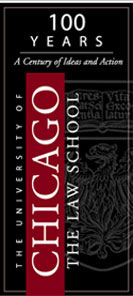Remarks for
the Centennial Celebration of the University of Chicago Law School
It has been half a century since I entered the Law School. Yet,
the vividness of my time there is still with me, as well as a
feeling of attachment to classmates whom I have seen only occasionally
in the intervening years.
Extraordinary how three years could have had such an impact.
We had an unusual array of outstanding teachers—Llwelleyn,
Mentschikoff, Meltzer, Kalven, Levi, Blum, Kurland, Currie, Sharp,
Katz, Dunham, Crosskey, and Teft—the classroom was a place
where intellectual sparks were struck and indelible impressions
were left. In my mind’s eye, I can conjure up images of
each of them, as if the classroom experiences occurred only yesterday.
Who can forget the time Karl Llewellyn came into class, read
to us from Learned Hand’s “Spirit of Liberty”
address, then stopped in mid-sentence, with tears in his eyes,
and said, “ I can’t go on…” and walked
out of the classroom, leaving us sitting there dumbstruck, but
with a memory that would last throughout our lives. Who can forget
Edward Levi sitting in and heckling from the rear in a class Aaron
Director was teaching. Who can forget Harry Kalven’s classic
baseball Torts hypotheticals.
In the intervening years, I have spent more than four decades
on the faculty of another first-rate law school. Perhaps, because
I pursued a career in law teaching, the Law School may have had
a more direct effect on specific aspects of my professional life
than on those of my classmates who followed other careers in the
law. Did I become a law professor because of my experience at
the Law School? This would be too simple an explanation; who can
account for cause and effect in the various choices we make in
life?
But in my teaching, I tried to model myself after some of my
teachers at the Law School and in my research and scholarship,
I was inspired, too, by their example. There were numerous times,
too, in the course of the past 40 years, when in addressing issues
of educational policy or curriculum or other issues that came
before the faculty of my school, I would think back to my time
at Chicago.
The Law School was for me a very special place.
From all reports and information that I have, it still is. I can
only wish that the legal education that my own students receive
leaves them with as strong and lasting an impression and as warm
feelings about their alma mater as mine did.
Norman Abrams
Professor of Law
UCLA Law School |



